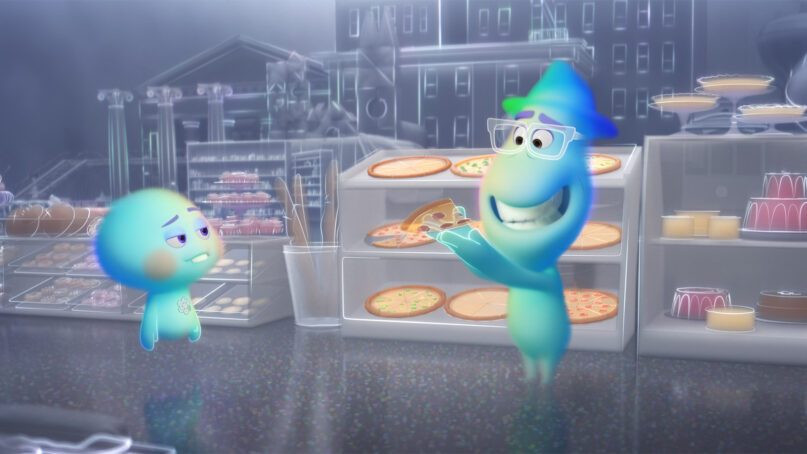(RNS) — The Rev. Suzan Johnson Cook, longtime Baptist minister and former religious freedom ambassador, took on another role with the new animated movie “Soul.”
She was not an actor or a director, but an adviser. In late 2019, she traveled to Pixar’s studios to watch a rough cut of the film. She was joined by other notable experts, including Fuller Theological Seminary President Mark Labberton, United Negro College Fund CEO Michael Lomax and musicians Yo-Yo Ma and Quincy Jones.
More than a year before its Christmas Day release on Disney+, Johnson Cook joined in giving feedback to Pixar’s directors and storytellers on the film, which centers on a New York band teacher named Joe Gardner, who strives to be a pianist at a famed jazz club. A misstep unexpectedly takes him to “The Great Before,” and, as a result, he learns more about the meaning of life.
“We came (up) with the comfortable answer that this was this man’s journey and that everyone has a soul, whether they believed or they did not believe,” she said of discussions about the ways people might view the word “soul.”
RELATED: Hollywood loves the Mormon afterlife
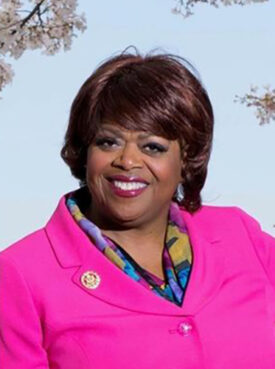
The Rev. Suzan Johnson Cook. Courtesy photo
The native New Yorker, 63, talked to Religion News Service Tuesday (Jan. 5) about her thoughts on “Soul,” Black culture and the next steps in her ministry.
The interview has been edited for length and clarity.
How did you come to be among three dozen cultural, music and faith advisers for “Soul”?
I was invited by (anthropologist and educator) Dr. Johnnetta Cole and Britta Wilson, who is the diversity leader at Pixar. They wanted a group of thought leaders, cultural advisers to look at both the faith piece — because Hollywood is still sensitive about spiritual questions — and also was this Black man portrayed in a positive way?
Have you ever served as a consultant for a movie before now?
I did once before with Mark Burnett and the History Channel Bible series about seven years ago. Same kind of thing. He was doing a movie, and he showed some of his storyboard panels to me. And I was, like, there’s no Black people in here. And so we ended up having an arrangement where I advised him, and he actually went out and cast (more) Black actors after that.
How do you define “soul” to Pixar and others?
When I use “soul,” I define it two ways. I do a cultural soul where we’re talking about the culture of Black people. There used to be a show on Channel 13 (in New York) — PBS — called “Soul!” which brought out the best of Black culture. So I used that definition. But then also I actually have a (devotional) book that’s “Soul Sisters,” and we’re connected at our spiritual soul as Black, Asian and Latino women. I’m a faith leader, so I wanted to make sure my definition wasn’t too strong, and their (Pixar’s) definition wasn’t too weak. But when we arrived at the cultural definition of soul, I was comfortable with that.
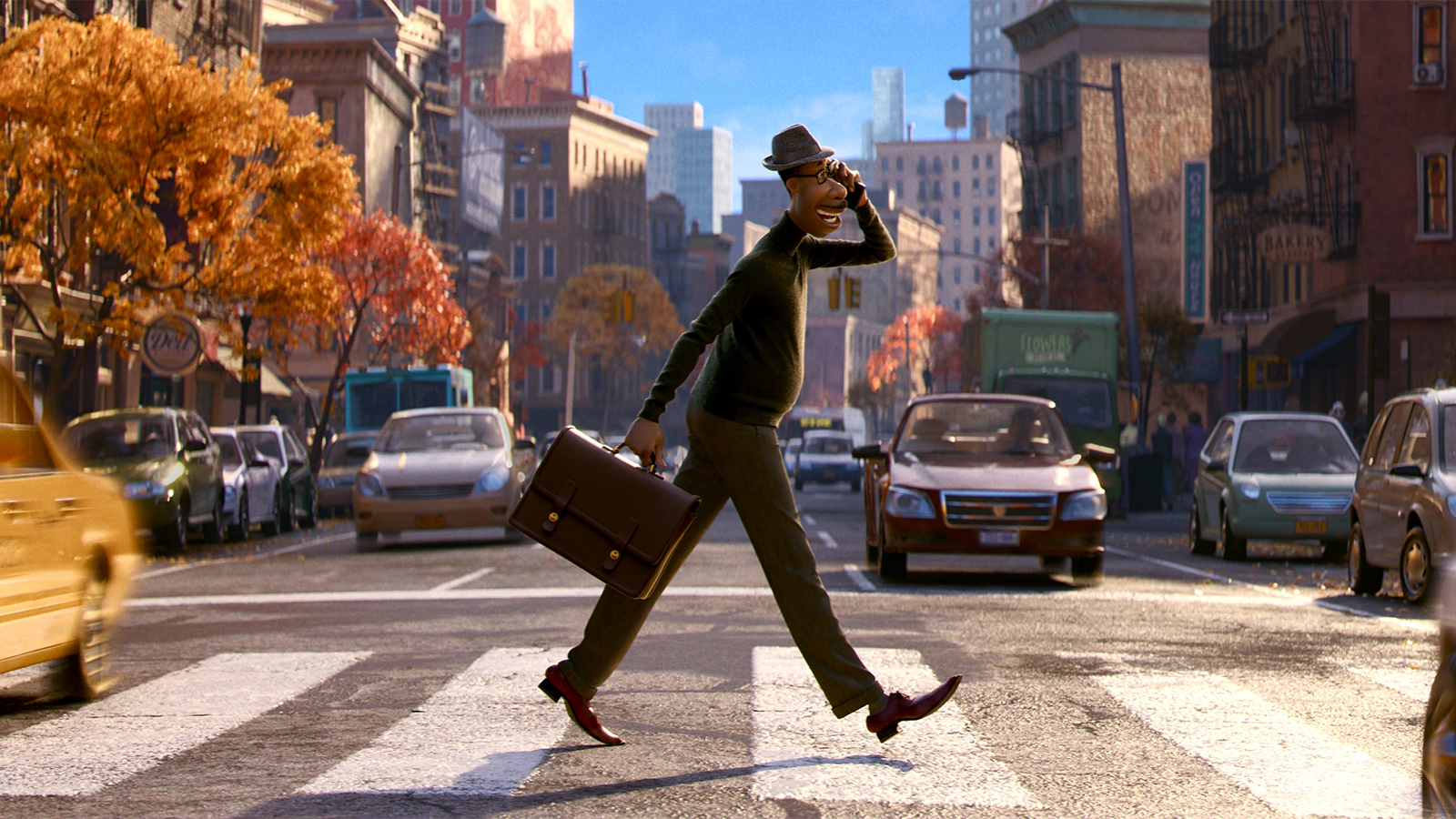
Musician Joe Gardner strolls through New York in the Disney/Pixar animated film “Soul.” Image courtesy Disney/Pixar
For all the talk of souls, there’s very little direct discussion of religion in the movie. I think the word “church” was mentioned once. Did that disappoint you?
No. It did not disappoint me. The ultimate goal of movies is to entertain, so I go to a movie with that perspective. I don’t go there for church. Whether I’m going to Harvard, whether I’m at the White House, everybody has a culture, and you learn the culture. That was the definition that was determined, and I was comfortable with that, that it was more cultural than religious.
RELATED: Religious freedom ambassador settles into role, diplomacy
Theologically, do you think there could be a place such as “The Great Before” — a place depicted in the film where a soul is before a person is born? Or do you think that’s just sort of imaginary?
Well, you know, there’s an African story that as an elder departs the next baby that comes in has the soul of the one who preceded them. I know in my own family, when my father died, my niece was born, and if that child did not embody the spirit of my dad. So, for me, I think it’s all intertwined. None of us know, but I believe the soul has a place and a resting place.
And what happened before, we don’t really know. You’ll hear a lot of people, particularly in the South, will say: “That’s an old soul.” It’s almost like they embody the people, the ancestors, who went before. They’re not supposed to know that much, but they do. So there has to be something there.
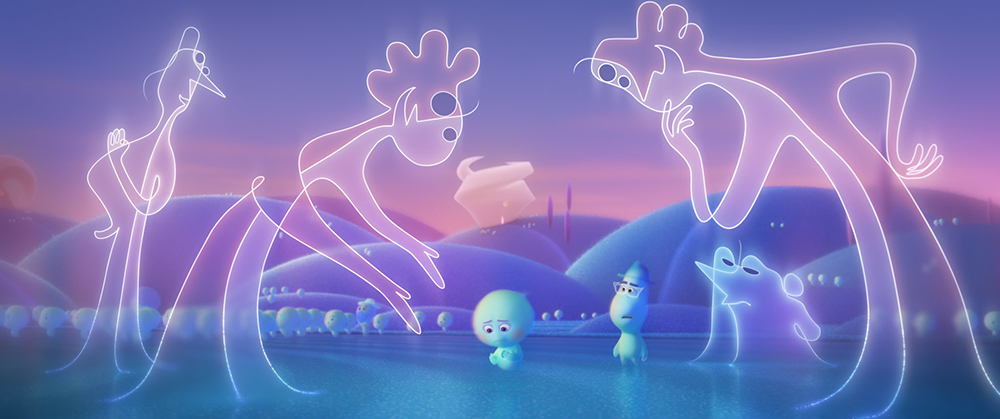
The Great Before in the Disney/Pixar animated film “Soul.” Image courtesy Disney/Pixar
The movie portrays how souls are guided into gaining their personalities and finding their “spark” before they come to Earth. How do you think we humans gain our personalities?
As a Christian, I think God has something to do with it. But I also know the families we are born into and the climates we’re born into have a lot to determine who we are. ‘Cause I initially was an introvert, but I was born into a family that was so social. Now I see my parents are Black socialites. We didn’t call us that then, but they would have parties in our home on Sunday after everyone came from whatever church they went to, and it would be filled with an eclectic room of people of every diverse background, of every diverse ethnicity and race. And my parents would say, “Don’t sit in the corner; go and introduce yourself.” And I became this very outgoing personality to the point now where I love entering a room. So I think my personality was definitely affected by the family I was born into. Now my sons, on the other hand, I’ll have the party, and they’re like, “OK, Mom. Do we have to come out now?”
As a Black woman, what struck you most about the way the film captured African American culture?
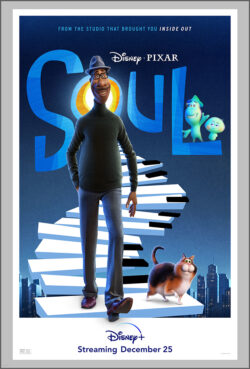
Poster for the Disney/Pixar animated film “Soul.” Image courtesy Disney/Pixar
We were reminded again of the best of our culture. It wasn’t just about this Black man Joe Gardner, but it was about Joe Gardner in the midst of a village. And I think that’s what makes our people soulful. And so when I sent out my email, I said, “May your Christmas be soulful.” And it was a good time of the year to be full of soul. And particularly at the end of the year, at the end of an administration where our souls were not always honored — in fact, they were damaged a lot. So this was a good way to say not just “joy to the world” but soul to the world.
You’ve been a minister, a religious freedom ambassador and now a movie consultant. What’s next for you?
I call myself a FED: faith leader, entrepreneur and diplomat. I’ve been busy building the Global Black Women’s Chamber of Commerce, because I think what makes us whole is not just mind, body and spirit, but it’s also commerce and cash and being Christian. It’s also helping women in ministry who are leading communities as well as congregations to really have it all together. So I’m about to announce a Lilly grant for the R.E.A.L. Black Women in Ministry initiative, and real stands for building relationships, entrepreneurial endeavors, access to power and leadership development and legacy. So I’m about legacy right now, making sure our people are whole and wholesome.
